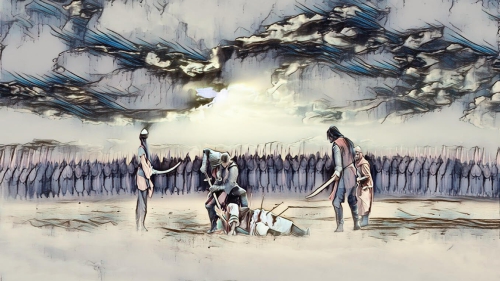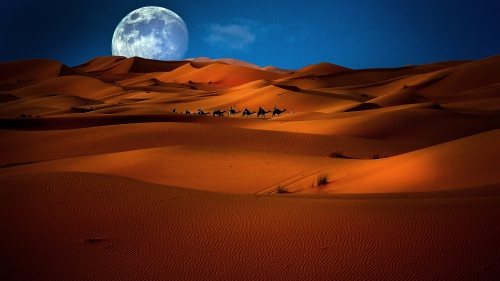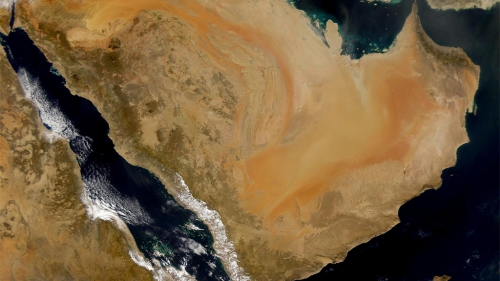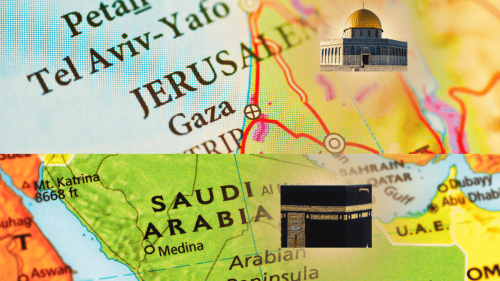Richard Francis Burton: A Bigoted and Militant Orientalist
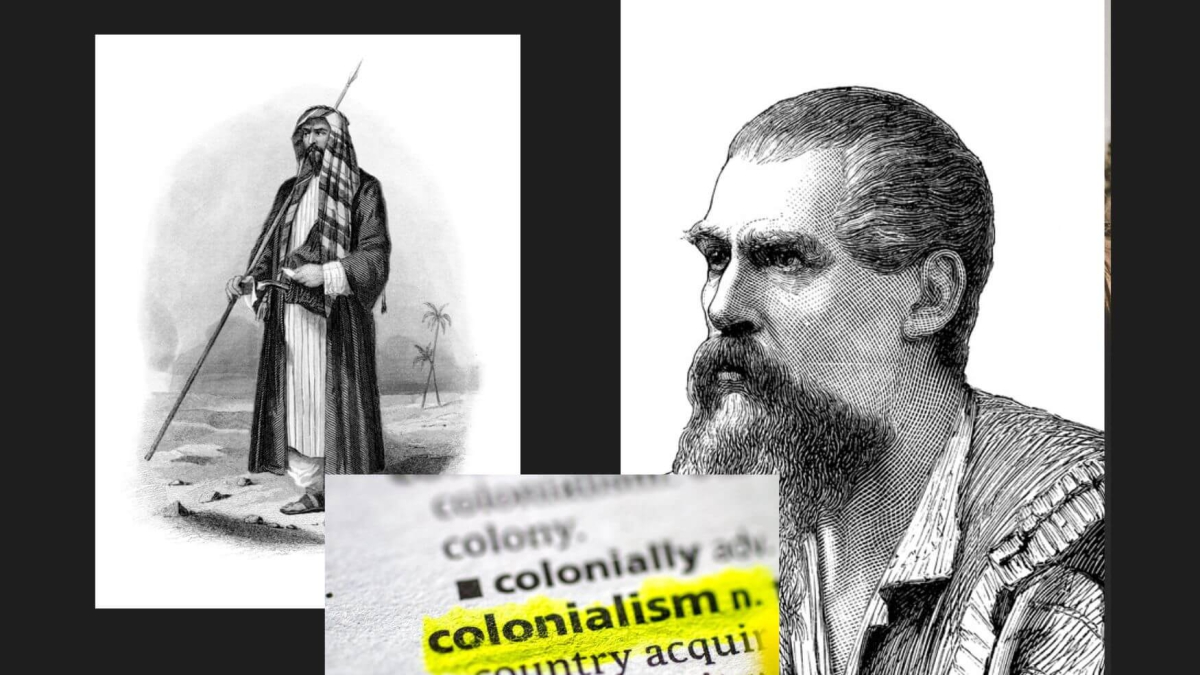
After the end of the 18th century – chiefly owing to Napoleon Bonaparte’s brief campaign in Egypt and Syria (1798-1801) - Orientalism expanded enormously. Edward Said calls this new phase “modern Orientalism”. The phase was more systematic and a more scholarly enterprise. It was a time when Europe came “to know the Orient more scientifically, to live in it with greater authority and discipline than ever before. But what mattered to Europe was the expanded scope and the much greater refinement given its techniques for receiving the Orient” (Edward Said).
Hence, although Napoleon’s campaign was a military failure, it nevertheless was a huge scientific and cultural success. It connoted a watershed in the cultural and civilizational relations together with exchanges between Islam and the West. Thus, out of the Napoleonic expedition, there issued a whole lot of Orientalists and a whole series of Orientalist “textual children”. What binds together all those textual children “is not only their common background in Oriental legend and experience but also their learned reliance on the Orient as a kind of womb out of which they were brought forth” (Edward Said).
Richard Francis Burton (1821-1890) was at once a product and specimen of modern Orientalism. He was a British explorer, Orientalist, geographer, soldier, and spy. In a way, he epitomized the new Orientalist proclivity, exuberance, scope, and competence, leaving an undeletable mark on the discipline and even on his age. He was a personification of the “perfect Orientalism man” (scholar, explorer, and agent). He authored over 40 books and countless articles. His best-known achievements include the book “Personal Narrative of a Pilgrimage to Al-Madinah and Meccah” and an unexpurgated translation of “One Thousand and One Nights” (Arabian Nights) as a collection of Middle Eastern and South Asian anecdotes and legends.
Burton was a versatile and resourceful personality. He was a bit of everything. It is hard to pinpoint a vocation or a talent and show that he excelled in it more than in others. Simply put, he was matchlessly himself, Richard Francis Burton, a unique hero who was known to his countrymen by his works, not by his careers and titles. According to his wife, Isabel, “during the last 48 years of his life, he lived only for the benefit and for the welfare of England and his countrymen, and the human race at large.”
Burton as a Maverick
At the same time, Burton was a person full of contrasts, a maverick. His eccentric and determined personality always coveted to be the best and on top. What was dangerous and impossible for others was normal and inviting for him, and what was normal for others was mundane and undeserving for him. He did not hesitate to fly into the face of danger to prove a point either to himself or to others. He was a perfectionist.
When his application for three years’ leave of absence on special duty from India to Muscat “for the purpose of removing that opprobrium to modern adventure, the huge white blot which in our maps still notes the Eastern and the Central regions of Arabia” was rejected on the grounds that “the contemplated journey was of too dangerous a nature”, Burton’s true self was stirred and he was left with little choice. “What remained for me but to prove, by trial, that what might be perilous to other travellers was safe to me? The ‘experimentum crucis’ (crucial experiment) was a visit to al-Hijaz, at once the most difficult and the most dangerous point by which a European can enter Arabia.”
Burton describes his willpower and strength of character thus: “Thoroughly tired of ‘progress’ and of ‘civilisation’; curious to see with my eyes what others are content to ‘hear with ears’, namely, Moslem inner life in a really Mohammedan country; and longing, if truth be told, to set foot on that mysterious spot which no vacation tourist has yet described, measured, sketched and photographed, I resolved to resume my old character of a Persian wanderer, a ‘Darwaysh’, and to make the attempt” (Burton’s “Personal Narrative of a Pilgrimage to Al-Madinah and Meccah”).
And to his critics and detractors, Burton simply conveys: “Judge not; especially when you are ignorant of the case which you are judging.” As if to suggest to everybody that they and their criticism, and the person as well as that which they criticize, are at different levels. They are worlds apart and instead of recklessly criticizing, credit ought to be given where credit is due. Burton let his deeds and accomplishments speak for themselves.
In any case, Burton’s personality was a mixture of remarkable scholarship, unprecedented individualism (egotism), and applied imperialism. Edward Said brands Burton as an Orientalist scholar and a gifted enthusiast whose contributions fall within the genre of imaginative and travel literature, which strengthened the established divisions “between the various geographical, temporal and racial departments of the Orient.” “By the end of the 19th century, these achievements were materially abetted by the European occupation of the entire Near Orient (except for parts of the Ottoman Empire, which was swallowed up after 1918). To colonize meant at first the identification - indeed, the creation - of interests; these could be commercial, communicational, religious, military, and cultural” (Edward Said).
Orientalism and colonization quickly became twins, one deriving its compass, strength, and legitimacy from the other. The servants of one, by the same token, were also the servants of the other – including Burton and his intellectual and material undertakings. Demarcation lines between the two realms and their personnel were fading away by the day.
Burton’s personal passions, mainstream erudition, and avant-garde character were often at loggerheads with each other. It was unpredictable when one of them would prevail over the others and would dominate his individuality. However, when meticulously reading his works, correlating the contents with the author and his inner universes, one can easily sense whenever an element of this triad rises above the rest and starts taking over the author’s disposition. Hence, while reading his works, one can read Burton as well. He has woven himself into his books. His books are himself-incarnate.
That is why to Burton’s wife, publishing the memorial edition of his magnum opus “Personal Narrative of a Pilgrimage to Al-Madinah and Meccah” was the best way to erect a less material, but more imperishable, monument to his name. Accordingly, preserving and knowing Burton’s books meant preserving and knowing himself. Discovering and celebrating them meant discovering and celebrating him. The explorer all of a sudden became set to be explored and the traveler to be traveled towards. She then proclaims at the end of her preface to the edition: “Let us reverently raise up this ‘Monument’, aere perennius (immortal and more lasting than bronze), to his everlasting memory.”
One thing remains certain, though, namely that an impeccable and lasting accord between the three personality dimensions of Burton was impossible. His was a personality of combativeness between his passions, scholarship, and character. Everything he wrote testifies to such a state, asserts Edward Said. For instance, “he seems to have taken a special sort of infantile pleasure in demonstrating that he knew more than any professional scholar, that he had acquired many more details than they had, that he could handle the material with more wit and tact and freshness than they” (Edward Said).
Some of Burton’s critics were unhappy about the personal and individualistic nature of his narratives, and about the extent his individuality manifested itself in and through them, calling into question the extent of his works’ objectivity and their scientific depth. But he did not budge, retorting as overconfidently as self-righteously. He pens about “Personal Narrative of a Pilgrimage to Al-Madinah and Meccah” that he has labored to make its nature correspond with its name, simply because “it is the personal that interests mankind.” Instead of being a weakness, the questioned character of the book, to Burton, is its strength. He afterwards continues in his defense: “Many may not follow my example; but some perchance will be curious to see what measures I adopted, in order to appear suddenly as an Eastern upon the stage of Oriental life; and as the recital may be found useful by future adventurers, I make no apology for the egotistical semblance of the narrative. Those who have felt the want of some ‘silent friend’ to aid them with advice, when it must not be asked, will appreciate what may appear to the uninterested critic mere outpourings of a mind full of self.”
Burton as a Militant Orientalist
Be that as it may, all of Burton’s interests were either overshadowed by or were fully saturated with the concerns and potential gains of the British and, to a lesser extent, European imperialism. The stage for all-out West-East (Occident-Orient) military, civilizational and ideological clashes was set long ago and virtually everything that ever since was happening on the West-East axis was happening in the background of the former. Everything was an integral part of and was shaped by it. The secondary goals of all other enterprises served but the clearly defined primary goals of the former. Positively, the orb of imperialism was the only prism through which the Orient was observed and in terms of which the results were marketable to the leadership and general public of the West (Occident).
Such was the case, especially with regard to Burton in his capacity as a British soldier, diplomat, and spy. Regardless of what he might have thought in his additional capacities as an explorer, Orientalist, writer, and geographer, for Burton the Orient was defined exclusively by material possession, by a material imagination, as it were. “England had defeated Napoleon, evicted France: what the English mind surveyed was an imperial domain which by the 1880s had become an unbroken patch of British-held territory, from the Mediterranean to India. To write about Egypt, Syria, or Turkey, as much as traveling in them, was a matter of touring the realm of political will, political management, and political definition. The territorial imperative was extremely compelling” (Edward Said).
The principal and secondary objectives of Burton’s secretive pilgrimage and of his writing a book about it clearly allude to his scholarly, idiosyncratic, and imperialistic self. Above all else, nonetheless, he embodies the sweeping imperialistic (colonial) culture, most faithfully serving it. He was a militant Orientalist. No wonder his last words about Egypt, before leaving it, portray it as a prize to be won by any competent and “lucky” European power. Egypt denoted a true treasure with infinite potential. It was a jackpot.
Burton speaks as though the West enjoyed the right of claiming and controlling Egypt with a focus on the former’s ever-expanding colonization appetite and aims. With his being a trained soldier and spy fully coming to light, he next presents a blueprint as to how to go about securing Egypt and optimizing its potential. In an instant, nothing else mattered, neither the architecture, nor civilization, nor socio-economic and political reality, nor manners and customs of the place and its people. The imperialist impulse eclipsed them all. It almost impaired the author’s thinking.
Burton thus elaborates: “But whatever European nation secures Egypt will win a treasure. Moated on the north and south by seas, with a glacis of impassable deserts to the eastward and westward, capable of supporting an army of 180,000 men, of paying a heavy tribute, and yet able to show a considerable surplus of revenue, this country in western hands will command India, and by a ship-canal between Pelusium and Suez would open the whole of Eastern Africa. There is no longer much to fear from the fanaticism of the people, and a little prudence would suffice to command the interests of the Mosque. The chiefs of corporations, in the present state of popular feeling, would offer even less difficulty to an invader or a foreign ruler than the Olema (scholars). Briefly, Egypt is the most tempting prize which the East holds out to the ambition of Europe, not excepted even the Golden Horn.”
Burton’s Bigotry
Burton was a bigot. He rarely said anything positive or praiseworthy about Islam, Muslims, Islamic culture, and civilization. Even when he does, he is ungenerous and thrifty, and his words are carefully measured and context-dependent. Whatever phenomena he had witnessed and whatever realities he had confronted on the ground, he never even considered stopping his raging presumptions and stereotypes from taking over his emotions and thought patterns that, in fact, initially might have run against the former. Everything had to be subjected to predetermined standards and cast into pre-formulated molds. No matter what happened, any form or degree of potential re-examination or amendment was out of the question.
For example, having entered the holy mosque in Makkah (al-masjid al-haram) and having witnessed the Ka’bah for the first time, Burton was visibly moved, yet stunned, by the spectacle. The feeling was compounded by the emotional as well as spiritual ecstasy of the pilgrims around him. He admits that there at last the Ka’bah lay, the bourn of his long and weary pilgrimage, realizing the plans and hopes of many and many a year. He wondered how few had looked upon the celebrated shrine, and how many, by extension, had been thwarted from doing so.
He was taken aback by the truth that the structure of the Ka’bah - as ancient and famed as it was – featured neither giant fragments of hoar antiquity as in Egypt, nor remains of graceful and harmonious beauty as in Greece and Italy, nor barbarous gorgeousness as in the buildings of India. “It was as if the poetical legends of the Arab spoke truth, and that the waving wings of angels, not the sweet breeze of morning, were agitating and swelling the black covering of the shrine.”
Such original emotions and realizations notwithstanding, Burton, as though dismissing or downplaying them all, simply dubbed the scene “strange” and “unique”. He then confessed the humbling truth to the effect that while the feelings of the rest of the pilgrims were the high feeling of religious enthusiasm, his was the ecstasy of gratified pride. While others harbored feelings of fear and awe towards the Ka’bah, he did those of vanity and self-worth. To him, furthermore, while other worshippers clung weeping to the mere curtain (Ka’bah’s kiswah or cloth) and pressed their beating hearts to the mere stone (Ka’bah’s main building material), he felt a much deeper emotion of self-righteousness and self-fulfillment. He clung to his ego and national identity, and pressed his beating heart to his personal, together with national, preferences and ambitions.
Similarly, as he traveled with his party to Madinah, Burton arrived at a point where a full view of the city suddenly opens upon travelers. He was amazed both by the scene and the reactions of his travel companions. He narrates how people halted their beasts as if by word of command. All of them descended, in imitation of the pious of old, and sat down, jaded and hungry as they were, to feast their eyes with a view of the holy city.
People were ecstatic and overjoyed, praying to and glorifying God and praising Prophet Muhammad in the most beautiful and expressive words. Burton commented that the poetical exclamations that had risen all around him were such that they demonstrated how deeply tinged with imagination becomes the language of the Arab under the influence of strong passion or religious enthusiasm. And surely, there was nothing more striking at the moment, after the desolation through which the people had passed, than the city of Madinah and the gardens and orchards that surrounded it. Burton next admitted that he understood the full value of a phrase in the Muslim ritual: “And when his (the pilgrim’s) eyes shall fall upon the trees of Madinah, let him raise his voice and bless the Apostle with the choicest of blessings.”
Burton could not deny, nor hide, the initial emotional elation that was saturating his personality as well. He said: “It was impossible not to enter into the spirit of my companions, and truly I believe that for some minutes my enthusiasm rose as high as theirs.” However, after those few minutes and those inexpressible feelings, when the people remounted and started moving to the city proper, Burton returned to his old self and his being a traveler and explorer with a purpose “returned strong upon him”.
Thenceforth, once inside the city and on his exploratory mission, for Burton it was business as usual. As a result, most of the things in, and associated with, Madinah, were seen as average, insignificant, second-rate, and unexciting. If there were some exceptions, though, they were so owing to some external influences. There was little that Madinah on its own could offer to the outside world.
Burton set the tone of his accounts when he wrote at the outset that at first sight Madinah as a city appeared a large place, but a closer inspection proved the impression to be erroneous. It was a small city, smaller than it seemed physically from a distance, and yet – allegorically speaking – it was lesser than it was projected globally. But to experience it as such and to verify the truth, one had to visit and inspect the city himself. To Burton, it follows, a visit to Madinah was a fact-finding and myth-busting mission. It was about setting the record straight.
Burton’s description of Madinah’s indigenous natural and man-generated components is peppered with such untimely and inapplicable idioms as, for instance, “white-washed buildings garnished with ugly square windows, an imitation of civilised barracks”; “the picturesque ruins of a large old sabil, or public fountain”; “dull grey mass of houses and ground”; “the thoroughfare is by no means remarkable after (witnessing the splendour of) Cairo”; “I was astonished to see on both sides of the way, in so small a place, so large a number of houses too ruinous to be occupied”; “muddy streets”; the approach to the Prophet’s mosque was choked up by “ignoble buildings” some actually touching the holy enceinte (wall or enclosure); the Prophet’s mosque was without “outer front” and without “general prospect”; the Prophet’s mosque was a building that had “neither beauty nor dignity”; the Prophet’s mosque was unpleasant and tasteless in terms of architecture and art, showcasing thereby the profound and awful ignorance of people; the columns of especially the southern qiblah arcade or portico (riwak) of the Prophet’s mosque featured the most vulgar arabesque and were generally adorned in such a way as to resemble “the stage-face of a London clown”.
In passing, that Burton was displaying an established thinking pattern testifies to the fact that he used similar expressions in the context of most of the built environment of, and life overall in, Cairo as well, such as: “exceedingly dirty”, “poor-looking”, “architectural lawlessness or anarchy”, “architectural plagiarism”, “Byzantine syncretism, carelessly and ignorantly grafted upon Arab ideas”, “the Azhar and Hasanayn Mosques are simple and artless piles, celebrated for sanctity, but remarkable for nothing save ugliness”, “disregard for symmetry”, “there is nothing attractive in its appearance”, “crooked marble columns”, “vulgarly cut shafts of various sizes”, “clumsy workmanship”, “they care little for the execution of mere details, and they have not the acumen to discern”, “their use of colors was a false taste”, “Arab greatness is the vulgar great, not the grand”, “torn and dirty matting”, “intensely dirty and full of fleas” and “dirty picturesque”.
While relating his impressions resulting from a stroll through the thoroughfares of old Cairo by night, Burton infers: “Briefly, the whole view is so strange, so fantastic, so ghostly, that it seems preposterous to imagine that in such places human beings like ourselves can be born, and live through life, and carry out the command ‘increase and multiply’ and die.”
Returning to the case of Madinah, the city to Burton - in short - was primitive and uncivilized. It was unconducive to a comfortable, refined, and cultured living. Most of its built environment, in particular the Prophet’s mosque, was unsophisticated and disagreeable. It demonstrated what Burton calls “a painful ignorance of art” and “architectural lawlessness”. Not even about the two most venerable points in Madinah in general, and inside the Prophet’s mosque in particular: the Rawdah (the noble garden) and the hujrah (the chamber with the Prophet’s grave), did Burton have anything affirmative to say. Rather, his comments persistently oozed the malice and prejudice which are unmistakable signs of extremist Orientalism and radical imperialism.
In addition, Burton articulated his skepticism that the Prophet’s remains were interred inside the hujrah. Trying to sow doubts – as will be seen later - he deemed that the hujrah was devoid of the Prophet’s body, despite the prevalent Muslim traditions and beliefs. He insinuated that such might yet have been one of the greatest machinations in history.
In the same vein, Burton emphasized that Islam was a bogus religion and Muhammad a bogus prophet. He did not subscribe to the idea that prophets Ibrahim and his son Isma’il ever visited Arabia, much less built the Ka’bah. Burton explains: “Whether Ishmael or his sire ever visited Meccah to build the Ka’abah is, in my humble opinion, an open question. The Jewish Scripture informs us only that the patriarch dwelt at Beersheba and Gerar, in the south-west of Palestine, without any allusion to the annual visit which Moslems declare he paid to their Holy City. At the same time Arab tradition speaks clearly and consistently upon the subject, and generally omits those miraculous and superstitious adjuncts which cast shadows of sore doubt upon the philosophic mind.”
All the miracles associated with Prophet Muhammad, many of whose physical loci were in Madinah, such as the Prophet’s miraculous relationships with and authority over animals, plants, and minerals, as well as over men, angels, and jinns – were probably some “of the many remains of ancient paganism pulled down and afterward used to build up the edifice of Islam.” As a matter of comparison, Burton further believed, Muslims were more superstitious in matters of faith than early Persians, ancient Egyptians, the Greeks, and Romans. They tend to exaggerate their dogmas. Their superstitions and other fallacies persisted at the ideological core of the edifice of Islam, causing it, as a consequence, to pale in comparison with the civilized, enlightened, and skeptical Europe.
In contrast, if there were a few entities in Madinah that were admirable, such was the case only on account of those entities being connected with the impacts of the Mamluks and the incumbent Ottomans and their ruling Empire. That applied as much to the realm of creative ideas as to the realm of practical creative solutions. Moreover, if some things were evocative of European brilliance, it was better still.
The message of Burton was clear. He conveyed thereby that the city of Madinah and its people, on their own, was nothing civilization-wise. Were it not for outside influences, they would hardly be able to survive, never mind generate a civilizational consciousness. Just like Makkah, Madinah too was a pilgrimage city. Without pilgrimage and pilgrims, the city would not even be worth mentioning. Its fate was dependence rather than independence, and alliance rather than non-alliance. Determining factors for its socioeconomic and political development and future did not reside within itself, but somewhere else. Hence, politically and economically - inside the framework of an emerging new world order - the place was vulnerable. It was susceptible like no other to the effects of power politics. Its role, even though potentially critical in the region, was set never to transcend the level of secondary importance internationally. Its political limits were changing with every generation. Consequently, never was stability its strong point.





